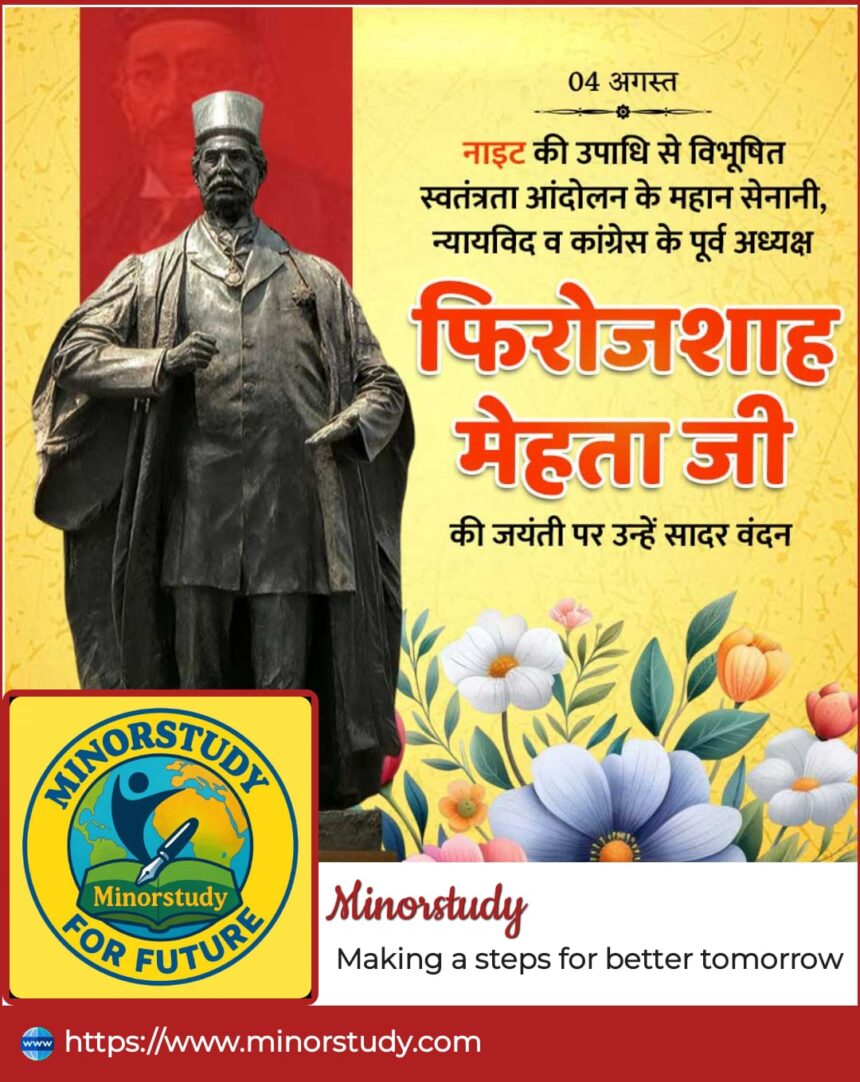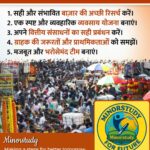🧭 Introduction
In the grand narrative of India’s freedom struggle, we often hear names like Gandhi, Nehru, and Tilak. But long before these leaders stepped onto the stage, there was a man who laid the constitutional and civic foundation of modern India—Sir Pherozeshah Mehta.
- 🧭 Introduction
- 📜 Who Was Pherozeshah Mehta?
- 🗓️ Timeline of Pherozeshah Mehta’s Life and Career
- 📚 Historical Contributions & Civic Reforms
- 🏙️ 1. Pioneer of Bombay’s Municipal System
- ⚖️ 2. Legal Reformer
- 🏛️ 3. Indian National Congress Leader
- 📰 4. Founder of The Bombay Chronicle
- 🏵️ 5. Role in Education and Public Health
- 🧾 Lesser-Known & Fun Facts About Pherozeshah Mehta
- ❓ Frequently Asked Questions (FAQs)
- Q1. What is Pherozeshah Mehta best known for?
- Q2. Did Pherozeshah Mehta support violent freedom struggle?
- Q3. Was he ever jailed?
- Q4. Is he still remembered today?
- Q5. Why was he knighted by the British?
- 🎉 Wishing and Honoring Pherozeshah Mehta
- 💡 Why He Is Important in Our Lives Today
- 🏙️ Daily Life Impacts of His Legacy
- 🔍 Important Points Summary
- 🎯 Conclusion: Why Pherozeshah Mehta’s Legacy Still Matters
Nicknamed the “Lion of Bombay”, Mehta was not only a visionary lawyer and political leader, but also an urban reformer and a champion of civil rights. His contributions to Indian society continue to echo through institutions, municipal reforms, and the idea of democratic representation.
Let us explore the life, legacy, and lasting significance of this incredible patriot.
📜 Who Was Pherozeshah Mehta?
Pherozeshah Merwanjee Mehta was born on August 4, 1845, in Bombay (now Mumbai), into a wealthy Parsi family. He grew up in an environment of education, reform, and service.
After graduating from Elphinstone College, he moved to London and was called to the Bar from Lincoln’s Inn. He returned to India with a vision—not just to practice law but to reform society and empower the masses through governance, representation, and civic duty.
🗓️ Timeline of Pherozeshah Mehta’s Life and Career
| Year | Event |
|---|---|
| 1845 | Born in Bombay on August 4 |
| 1864 | Graduated from Elphinstone College |
| 1868 | Became a Barrister from Lincoln’s Inn, London |
| 1873 | Elected to the Bombay Municipal Corporation |
| 1884 | Became President of Bombay Municipality |
| 1885 | One of the founding members of the Indian National Congress |
| 1890 | Served as President of the Indian National Congress |
| 1905 | Knighted as Sir Pherozeshah Mehta by the British Government |
| 1915 | Passed away on November 5, leaving a legacy of reforms and values |
📚 Historical Contributions & Civic Reforms
🏙️ 1. Pioneer of Bombay’s Municipal System
Pherozeshah Mehta is known as the Father of Bombay Municipality. He drafted the Bombay Municipal Act of 1872, laying the groundwork for a modern, accountable, and responsive city government.
⚖️ 2. Legal Reformer
Known for his sharp intellect and fearless advocacy, Mehta was a formidable figure in the Bombay High Court.
Fought against arbitrary laws and police excesses, helping institutionalize the rule of law.
🏛️ 3. Indian National Congress Leader
One of the founding fathers of the Indian National Congress in 1885.
Served as President of the INC in 1890, advocating constitutional and moderate paths to reforms.
📰 4. Founder of The Bombay Chronicle
In 1913, he started The Bombay Chronicle, a daily newspaper to raise political consciousness and advocate Indian rights.
🏵️ 5. Role in Education and Public Health
Promoted education for all, particularly among the Parsi community and women.
Championed better sanitation, clean water, and urban infrastructure in Bombay.
🧾 Lesser-Known & Fun Facts About Pherozeshah Mehta
📖 He was the first Indian to be appointed Vice-Chancellor of Bombay University.
🦁 Known as the “Lion of Bombay” for his commanding speeches and civic leadership.
🧑🎓 He mentored many future freedom fighters and reformists, including Gopal Krishna Gokhale.
🏅 Was knighted in 1905 by the British—yet he never compromised on Indian rights.
📚 His autobiography and speeches were used as reference material in early political science education.
🏫 Several institutions and roads in Mumbai are named after him, including Pherozeshah Mehta Road.
✍️ Was one of the earliest to promote the idea of home rule through gradual reform.
❓ Frequently Asked Questions (FAQs)
Q1. What is Pherozeshah Mehta best known for?
A: He is known for being the Father of Mumbai Municipality, founding the Indian National Congress, and promoting civic governance reforms.
Q2. Did Pherozeshah Mehta support violent freedom struggle?
A: No, he believed in constitutional reforms, dialogue, and lawful protest.
Q3. Was he ever jailed?
A: No, he was a moderate leader and worked within the British legal framework to bring about change.
Q4. Is he still remembered today?
A: Yes! Roads, institutions, and civic bodies continue to honor him. He’s also remembered in legal and municipal education in India.
Q5. Why was he knighted by the British?
A: For his contributions to law, education, and civic governance. However, his loyalty was always to the Indian people.
🎉 Wishing and Honoring Pherozeshah Mehta
“🌟 May the legacy of Sir Pherozeshah Mehta continue to inspire generations to uphold justice, serve society, and build a better nation.”
Let us remember this giant of Indian public life not just with words, but through our actions of responsible citizenship and civic participation.
💡 Why He Is Important in Our Lives Today
🧠 As a Thinker:
Encouraged critical thinking, legal reasoning, and rational governance.
🏛️ As a Reformer:
Taught us the importance of local governance and public participation.
📢 As a Voice:
Used media as a tool for awareness, showing us the power of informed public discourse.
👨🏫 As a Teacher:
Inspired generations of leaders, proving that education is the true weapon of change.
🏙️ Daily Life Impacts of His Legacy
| Impact Area | How It Affects Us Today |
|---|---|
| Municipal Corporations | Democratic, decentralized urban governance |
| Law and Judiciary | Constitutional methods for justice |
| Freedom of Press | Strengthening democracy through media |
| Education | Promotion of access and quality |
| Urban Planning | Clean cities, water systems, sanitation |
His efforts in these areas shaped the modern Indian urban experience, making him relevant to our daily lives even in 2025.
🔍 Important Points Summary
🏛️ Founder of Bombay’s civic structure
🧠 Legal genius and constitutionalist
📰 Freedom of Press pioneer
🇮🇳 Founding member and President of INC
🏫 Educationalist and social reformer
👑 Knighted, yet deeply nationalist
📚 A mentor, a voice, and a visionary
🎯 Conclusion: Why Pherozeshah Mehta’s Legacy Still Matters
Sir Pherozeshah Mehta was much more than a politician. He was a visionary urbanist, a reformer with integrity, a mentor to freedom fighters, and a champion of lawful resistance. He envisioned an India where democracy, civic awareness, and education lead the way—not violence or division.
In a world often caught in the extremes of activism and apathy, Mehta’s moderate, thoughtful, and firm approach offers a balanced, ethical path forward. His life teaches us that true nation-building happens in everyday institutions—in city councils, courtrooms, schools, and newspapers.








